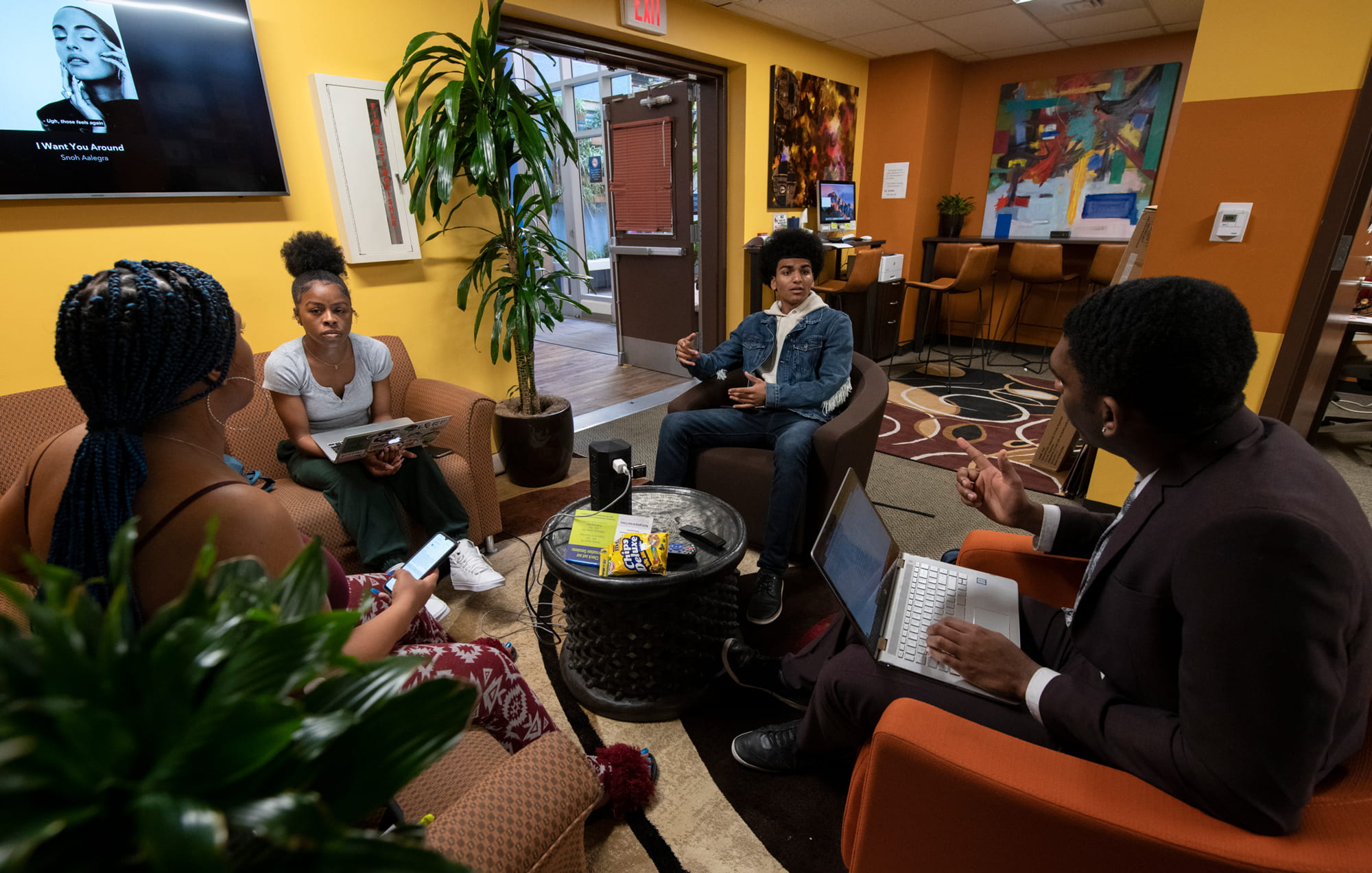Celebrating Black History Month
Dedicated resource center helps students feel at home on campus
By Lilibeth Garcia
Located just downstairs from UCI’s bustling Student Center terrace, the Center for Black Cultures, Resources & Research – a cozy space awash in warm colors – can feel like an oasis for black students, staff and faculty. Although African Americans make up only about 3.5 percent of the campus population, at the CBCRR, they’re the sole focus.
Established in 2016, the center opened its doors to students in the fall of 2017 in response to Black Student Union demands. Its growing popularity since then can be attributed, in part, to Àdísà Àjàmú – founding director of the CBCRR and a developmental psychologist – who saw the need for a home away from home.
“The center was designed to treat the student as more than just a student, as a whole person with psychological, physical, spiritual and emotional needs. Supplying academic resources can only do so much when students may also be housing- or food-insecure, feeling alienated or facing discrimination,” Àjàmú says. “On move-in day, when I meet parents, I look them in the eye and tell them: ‘Your kid is going to be safe with me.’ I have an obligation to honor that promise.”

While the CBCRR offers a wide variety of services, resources and programs based on its four pillars – health, wellness, vitality and academic success – students often come to the center to simply study, relax, socialize or watch TV. They also come for emotional and scholastic support; the center has two psychologists and two academic advisers who offer drop-in hours. Àjàmú works closely with students on personal, interpersonal and financial issues, which may involve serving as a mediator if someone thinks he or she has been discriminated against on campus, whether by other students, staff or faculty.
“There’s an asymmetry of power, so if students feel like they’ve been treated unfairly by a professor, they’re likely to be uncomfortable challenging that professor. But I’m a former professor and a psychologist, so when I reach out to the professor, it’s as a colleague; there’s a difference,” Àjàmú says. “So we try to take the burden off the student. I’ve never had an instance since I’ve been here where we weren’t able to resolve an issue amicably.”
CBCRR program coordinator Niobe Duke, who earned a bachelor’s degree in economics at UCI in 2018, acknowledges the importance of creating a sense of safety. “We always tell students that they can reach out to us for anything,” she says. “If they’re having a hard time with classes or just friends and family, they can come in and talk to us. We’re always here for them.”

Largely operated both by and for students, the center has six apprentice directors – each with a different major-related focus – who apply their skills, knowledge and experience to help black peers. Karilyn Odom, apprentice director of applied innovation, for example, is a senior in engineering whose job is to share relevant information and curate events about science and technology and how they intertwine with black culture.
They host weekly signature programs, which include Sista Circle: For Womxn of the Diaspora; Wahbruda: A Men’s Circle; and Space: For Queer & Questioning Black Folks.
Events
This February, in honor of Black History Month, UCI is hosting several campus events on race, African culture, the African diaspora and African American history – ranging from incisive lectures to theater, dance and musical performances.
Feb. 7: Talk on “Race After Technology” by Ruha Benjamin (5-6 p.m.)
Feb. 8: “Ain’t Misbehavin’: The Fats Waller Musical Revue” (8 p.m.)
Feb. 14: Interactive session on “Transforming the Inner Turmoil Around Race and Racism” with Valerie Sheppard (6:30-9 p.m.)
Feb. 18: Workshop on “Dancing the Diaspora: Exploring the African Diaspora Is a Movement” with Sakina Ibrahim (6:30-9 p.m.)
Feb. 21: “Iridescent” musical performance by Nicole Mitchell and Christina Wheeler (8 p.m.)
“I went from not having this space for myself to having it and then seeing what it actually does for students… We are making a difference.”
“The idea is that black people of all kinds are welcome here,” Àjàmú says. “There is no litmus test for blackness, and I think that has gone a long way toward making us feel like a family, because everyone feels that they are welcome and can kind of find their own niche. Our motto is unity without requiring uniformity.”
In addition, the CBCRR offers numerous free resources, including unlimited printing, book sharing, on-site laptop use, Scantron sheets, tutoring, career and professional development, and guides on entrepreneurship and scholarships. Meal, housing and financial aid support is also available. And the center’s numerous partnerships with schools and organizations across campus help connect black students with faculty and staff who are eager to mentor them.
A little over 2 years old, the CBCRR is helping black students thrive.
“I went from not having this space for myself to having it and then seeing what it actually does for students. Some of them have stress from school, but when they’re in here, they’re always laughing and enjoying each other’s company,” says Duke, who was a senior when the center opened. “I’m overjoyed to see those who had been struggling actually graduate, personally thanking me for helping them get there. We are making a difference.”
Kamerahn Francisco-Laititi, a senior majoring in criminology, law & society and the CBCRR’s apprentice director of social justice and activism, concurs and says of the center: “It goes to show the power of students – especially black students – and how they have a voice. We are a super small population on campus, but when we put our voices together, we can make something beautiful happen.”
